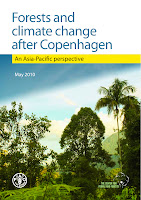 |
| DOWNLOAD |
Was progress on REDD set back because of the failure at COP15 to reach an overall binding agreement on emission reductions?
Progress on REDD was not stalled by the overall lack of a binding agreement on emission reductions;
to the contrary, important progress was made. While an overall agreement would have significantly boosted REDD negotiations, they are still more advanced than those on most other issues being discussed under the UNFCCC framework. More importantly, the REDD+ text arising from COP15 provides a firm basis to move forward. Despite this progress, many issues concerning design and implementation remain unresolved and will require more detailed discussion, before and after the next formal meetings of negotiators.
Whilst global negotiations continue, there is considerable momentum to support work towards REDD ‘readiness.’ Further details on technical guidance will emerge over the coming months, though there is a general consensus that REDD+ will be implemented in phases. Progress made by UN-REDD, bilateral initiatives, government-supported pilots, and the engagement of civil society means that the Asia-Pacific region is further ahead with Phase 1 activities than are other regions.
COP15 should not be considered a failure from a forestry perspective. The Copenhagen Accord provides a platform for countries with different priorities to discuss and move ahead with negotiations, particularly in the forestry sector. There is cautious optimism that COP15 has laid the foundation for more meaningful outcomes in future COP meetings.
REDD+ phased approach
Phase 1: National REDD strategy development, including national dialogue, institutional strengthening, and demonstration activities.
Phase 2: Implementation of policies and measures (PAMs) proposed in those national REDD Strategies.
Phase 3: Payment for performance on the basis of quantified forest emissions and removals against agreed reference levels.
Phase 3: Payment for performance on the basis of quantified forest emissions and removals against agreed reference levels.
The Copenhagen Accord
The Copenhagen Accord is a statement of principles and politically-binding (but not legally-binding) commitments. The Parties to COP15 ‘took note’ of the Accord, but did not officially ‘adopt’ it. Parties were invited to ‘associate’ themselves with the Accord by specifying the commitments and policy measures they intend to make. Under the Accord, Annex 1 countries are expected to make ‘economy-wide emissions targets’ for 2020 while non-Annex 1 countries would list ‘mitigation actions.’ By making such commitments, countries in effect set themselves voluntary targets. By mid-March 2010, 73 countries had associated themselves with the Accord.











0 komentar:
Post a Comment